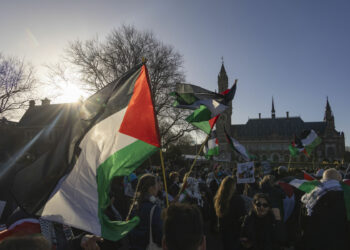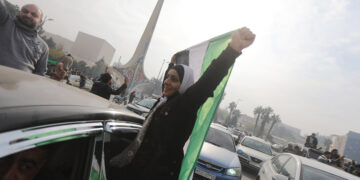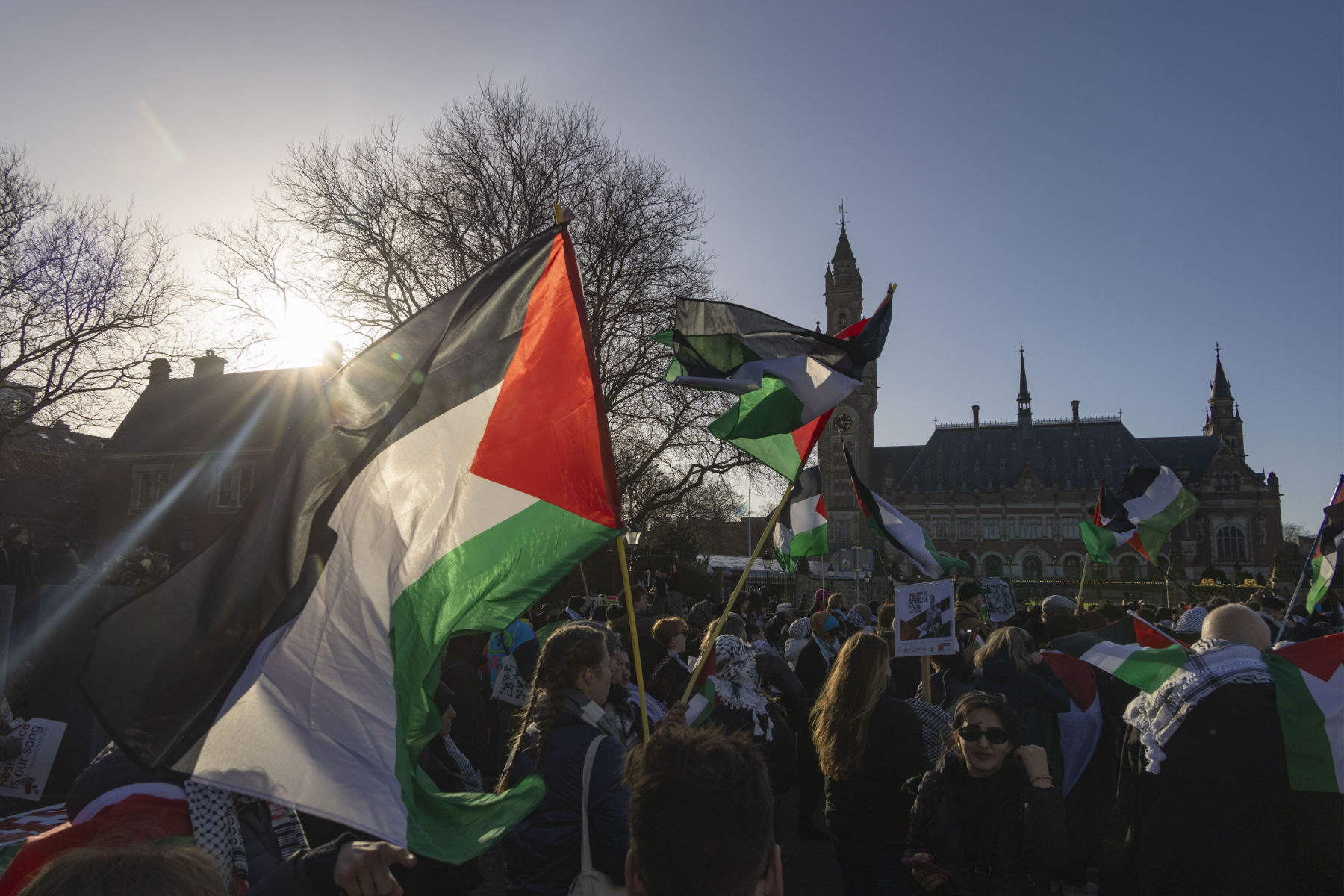Human rights organizations, advocacy groups and think tanks should review impact of calls for aid conditionality, lawfulness of U.S. military transfers to abusive governments
عربي
(Washington, D.C.) — Policies predicated on conditioning U.S. military support to abusive governments in the Middle East and North Africa (MENA) on human rights reforms have failed to achieve meaningful reforms and have diverted from a focused effort to end such arms transfers, as required by U.S. law, DAWN said today in a new policy paper. Human rights organizations, advocacy groups and think tanks that have argued for partially conditioning U.S. military support to abusive MENA governments on human rights reforms should assess the effectiveness and impact of those calls.
Following a recent workshop on aid "conditionality" cohosted by DAWN and the Massachusetts Institute of Technology's Center for International Studies that included over 30 leading foreign policy organizations, DAWN has released a detailed list of recommendations to the foreign policy community, urging it to review the lawfulness, as well as ethical and strategic merits, of continued U.S. military transfers to abusive governments and their impact on the affected populations. The recommendations draw directly on that workshop, which was held on May 7, 2021 and conducted under "Chatham House rules." An in-depth report documenting the workshop's sessions and debate can be accessed here.
With the recommendations, DAWN urged the foreign policy community to ensure that they consult with independent civil society members of the relevant countries and include their voices in discussions and advocacy about U.S. policy toward their countries.
"Many of us in the advocacy community have been on autopilot, operating on the questionable assumption that the best strategy for U.S. engagement with abusive governments is placing human rights conditions on a part of its military aid, as opposed to insisting that all such aid end," said Raed Jarrar, Advocacy Director of DAWN. "Not only has this approach achieved negligible human rights advancements, it fails to challenge the lawfulness, ethics and merits of the U.S. providing any support at all for gross violators of human rights."
Underscoring the urgency of the debate over aid conditionality, U.S. Secretary of State Antony Blinken is currently considering whether to release $300 million in foreign military financing to Egypt, which Congress has conditioned on improvements in Egypt's human rights record. Blinken can waive those conditions through a national security waiver.
He faces a deadline at the end of September on whether to release the security assistance—as more evidence mounts of the Egyptian government's efforts to silence human rights defenders in Egypt and even in the United States. Even if the Biden administration maintains the block on that $300 million in military aid, the impact of withholding it is far outweighed by the fact that there is still roughly $1 billion in continued U.S. support for the Egyptian government this year.
"Many of us in the advocacy community have been on autopilot, operating on the questionable assumption that the best strategy for U.S. engagement with abusive governments is placing human rights conditions on a part of its military aid, as opposed to insisting that all such aid end."
- Raed Jarrar, Advocacy Director at DAWN
DAWN's policy paper argues that U.S. military transfers to abusive governments violate not only U.S law—pursuant to Section 502(B) of the Foreign Assistance Act, which bans military aid to grossly abusive governments—but international human rights law as well, which prohibits states from contributing to human rights abuses. Calls to condition U.S. military support on reforms are inherently partial and inadequate, and can also contribute to harm.
They fail to challenge the lawfulness of, and strategic justifications for, U.S. military support for abusive governments, merely seeking to condition it, at best partially.
Conditionality fails to recognize U.S. human rights obligations by placing all responsibility for abuses—and therefore blame—on the recipient government. Despite the fact that military aid has virtually never been cut, continued calls for the U.S. government to "pressure" abusive governments that receive U.S. aid propagate two dubious notions: that the abusive government is willing to reform, and that the U.S. is imposing meaningful conditions on its arms support. Aid conditionality distracts from recognizing that ongoing U.S. military support for abusive governments makes the U.S. complicit in their abuses, harms the people of the MENA region, and harms U.S. standing and interests.
The recommendations proposed by DAWN aim to contribute to the important work of the foreign policy community to advocate for better, more informed U.S. foreign policy decisions and correct much of the damage that has been done by U.S. arms transfers and financial and diplomatic support to abusive, apartheid and authoritarian governments in the MENA region.
"Over the last 30 years, conditionality for human rights reforms has come in for its share of criticism," said John Tirman, the Executive Director and a principal research scientist at MIT's Center for International Studies. "Even conditions imposed for good reasons tend to be capricious and unwieldy, often honored in the breach. This analysis sharply exposes why conditionality is a fool's errand."
Several papers presented at the workshop have now been adapted into articles, published this week in DAWN's journal, Democracy in Exile.
The workshop first addressed conditionality as a concept, including its usage and effectiveness. The panelists and attendees primarily addressed the weaknesses of aid conditionality, whether advocated by human rights organizations, advocacy groups or think tanks. First, would the conditioning of U.S. aid actually serve to alter the calculus of recipient actors? Since much of this U.S. support is used to buttress the authority of ruling regimes in the MENA region, whether it is continued or discontinued is unlikely to alter those regimes' central objective to consolidate their own power.
Second, does such support actually serve to advance U.S. interests, conceptualized broadly as American security or prosperity? Because abusive governments in the region use U.S. support for their own narrow purposes, considerable doubt was raised at the workshop regarding what the United States actually gets in return for its aid.
The workshop then examined possible alternatives to conditionality. Panelists and participants emphasized that conditionality is no longer relevant because meaningful reform in these governments is not possible, especially after the Arab uprisings of 2011, when regimes across the region responded to popular demands for reform with political crackdowns, coups and counterrevolutions.
Whether it is military aid, economic assistance or political protection, U.S. support will in one way or another "feed" these dictatorial regimes, which have brutally suppressed civil society and any protest movements at home.
"Over the last 30 years, conditionality for human rights reforms has come in for its share of criticism."
- John Tirman, the Executive Director and a principal research scientist at MIT's Center for International Studies.
Instead, in order to uphold international norms and international law, the United States should follow its own domestic laws regarding human rights and military aid to abusive foreign governments. Despite being on the books for years, these laws are continually disregarded by both Democratic and Republican administrations, or effectively nullified through national security waivers.
Rather than condition aid, whether military or economic, on unachievable aims of reform, the U.S. should completely cut off its aid to abusive governments, with no more flawed assumptions that it will and should later continue. The U.S. government must fundamentally rethink its foreign policy priorities in the MENA region and ensure that it is no longer complicit in gross violations of human rights.
Listed below are DAWN's recommendations following the workshop.
Recommendations
To the Foreign Policy Community
Enhance research and policy recommendations to the U.S. government:
- Critically review and examine the outcomes and effectiveness of past policy recommendations to condition U.S. arms transfers, economic aid and diplomatic protection to assess whether they have been implemented and what measurable impact they have had on the behavior of a government engaged in systematic and widespread violations of human rights and/or international humanitarian law.
- Ensure that investigations include research to represent the views of independent voices among communities impacted by the abusive government .
- Ensure that public presentations are balanced to include independent voices from impacted communities.
Ensure that all reports and writings regarding U.S. policy in the MENA region:
- Critically assess and address the role and impact of U.S. support to abusive governments. If recommendations assume the continuation of such support, even if premised as conditioned on human rights reforms, explain why such support should continue and the costs and benefits of such support.
- Critically examine the extent to which continued U.S. support to an abusive government helps or hinders the asserted interests, as well as the human rights of the relevant country's population. Verify that continued U.S. support will not harm the rights and interests of the population.
- Ensure that reports discuss, distinguish and highlight the extent to which an abusive government is democratically elected, representative and accountable to its population. Can it fairly be described as capable of acting in the interests of its people?
- Ensure that reports clearly identify that U.S. support is made to a government, and not to the country or its people—for example, "arms transfers to the government of Saudi Arabia" and not "arms transfers to Saudi Arabia."
- Include an assessment of U.S. obligations under international human rights law and the laws of war, as well as domestic laws prohibiting the transfer of arms to abusive governments.
- Specifically, address and demand U.S. compliance with:
- International human rights and humanitarian law.
- Section 502B of the Foreign Assistance Act (codified at 22 U.S.C. § 2304(a)–(i)).
- The Leahy Laws, including section 620M of the Foreign Assistance Act of 1961, 22 U.S.C. 2378d, and Section 362 of Title 10 of the U.S. Code.
- Commit to properly including the voices of people from countries receiving U.S. support, particularly political exiles, whose independent perspective serves as a counterweight to government narratives. Any analysis of the ramifications of such assistance is incomplete without firsthand testimony about how this aid will impact people on the ground.
Source: Getty Images.






































